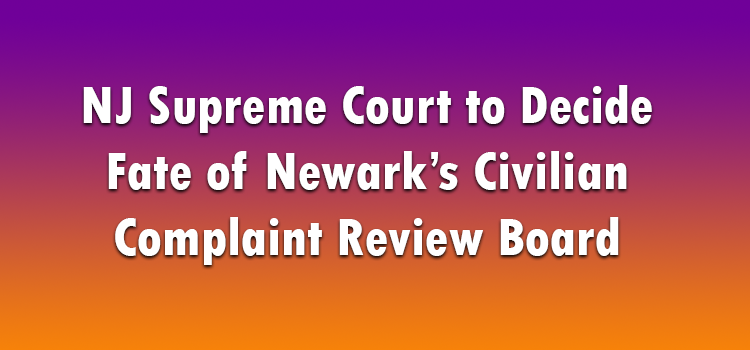The Supreme Court of New Jersey has agreed to consider Fraternal Order of Police Newark Lodge No. 12 v. City of Newark. The case involves the legality of Newark’s civilian complaint review board, which was established to investigate allegations of police misconduct.

Facts of Fraternal Order of Police Newark Lodge No. 12 v. City of Newark
The City of Newark enacted an ordinance creating a civilian complaint review board (CCRB), in response to a “pattern or practice of constitutional violations” by the Newark Police Department (NPD). The violations were the subject of a U.S. Department of Justice investigation that found recurrent problems with the investigative affairs (IA) function of the NPD and resulted in a consent decree in a federal lawsuit.
As described by the Appellate Division, “The Ordinance is the embodiment of the City’s legislative policy decision to enable transparent investigation and examination into allegations of police misconduct.” Among other powers, the Ordinance authorizes the CCRB to conduct its own investigations of complaints filed by members of the public (including NPD members) against any member of the NPD. The CCRB can’t adjudicate complaints or impose discipline, but rather is tasked with investigating alleged police misconduct and making recommendations.
In August 2016, the Fraternal Order of Police Newark Lodge No. 12 (FOP), the exclusive collective negotiations representative for NPD officers, filed an order to show cause and a verified complaint. FOP alleged ultra vires creation of subpoena power by the Ordinance, in violation of N.J.S.A. 40:48-25 and the Faulkner Act, N.J.S.A. 40:69A-36. It contended that there existed an inconsistency between the Ordinance and the AG Guidelines and discipline of police officers by the IA division, in violation of the Law Enforcement Officers Protection Act, N.J.S.A. 40A:14-181. The FOP also alleged that the Ordinance deprived officers of due process and violated N.J.S.A. 40A:14-118, by infringing on the Chief’s rights.
The trial court invalidated the Ordinance with two exceptions: (1) the CCRB could perform an oversight function, and (2) the CCRB could consult with the Public Safety Director and NPD in the creation of the discipline matrix. The City of Newark appealed.
Appellate Division’s Decision
The Appellate Division held that the Ordinance is valid on its face with two exceptions. First, it found that the Ordinance infringes upon the Chief’s statutory rights by making the CCRB’s findings of fact binding, absent clear error. Second, it found that the Ordinance improperly permits disclosure of complainant and police officer identities. “Otherwise, we conclude that the CCRB can function as intended under the Ordinance, including providing an oversight role by investigating alleged police misconduct, conducting hearings, participating in the development of a disciplinary matrix, making recommendations, and issuing subpoenas,” the court wrote.
Issues Before the New Jersey Supreme Court
The New Jersey Supreme Court granted certification on October 21, 2019. It has agreed to consider the following question: “Does Newark’s ordinance creating a civilian complaint review board with the authority to issue subpoenas and investigate complaints of alleged police misconduct violate N.J.S.A. 40A:14-118, the Attorney General Guidelines on Internal Affairs Policy and Procedures under N.J.S.A. 40A:14-181, or police officers’ due process rights?”
Oral arguments have not yet been scheduled in the case. Please check back for updates.
